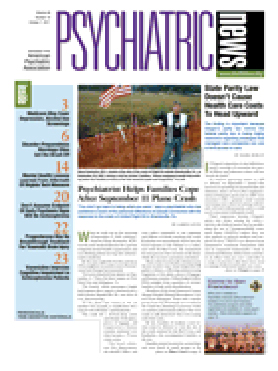APA's Institute on Psychiatric Services (IPS) has long served those who are interested in a multidisciplinary psychiatric meeting with an emphasis on clinical topics. The meeting is often referred to as "APA's secret gem" and "resident-friendly meeting." IPS staff asked members of the American Association of Community Psychiatrists for their thoughts about the institute. Here are some of the replies:
I attend IPS to add to what I know about community psychiatry. There is always something new to learn, and my peers at IPS teach me. It's also great to see my siblings in the field of community psychiatry, find out what they are doing, and then add their insights to my practice.
—Curtis N. Adams Jr., M.D.
When I got back from my first IPS and was raving about how great it was, I literally told people, "IPS is where APA hides all the cool psychiatrists."
—Margaret Balfour, M.D., Ph.D.
After nearly 35 years of attending both the APA annual meeting and the IPS, it has become clear to me that the most functional and practical meeting offered by the organization is the IPS. Those of us who are "hands on" practitioners find the meeting's timing practical (not interfering with graduations and so on) and useful for obtaining excellent, up-to-date clinical and research information. Also important, particularly due to the current economic, health care policy, and political environments, are the opportunities to learn about, discuss, and network with others regarding recent changes and issues in funding and policy reform, among other related topics.
I am moving into retirement mode and will likely limit my attendance and participation in the organization to the IPS for the reasons mentioned above. I trust that many others share my opinions on this issue.
—Michelle O. Clark, M.D.
When the founding members of APA gathered together in 1844, they met in what can be considered the true progenitor of the Institute on Psychiatric Services: a meeting by, for, and about public-sector psychiatry: a smaller, intimate meeting, ideal for exchanges of ideas with those you've known since residency and those you've just met who are residents themselves. It's a meeting for sharing and caring, and there are fewer such meetings all the time. Whether it's a recession or a depression, the IPS provides excellent relief.
—Jeffrey Geller, M.D.
I haven't missed an IPS since residency, and I keep coming back for the collegiality and networking that only a smaller and more intimate meeting can offer. Add this to the timely and uniquely provocative clinical and services program offerings geared to real-life psychiatry, and for me the experience is unparalleled. Behavioral health care is in a phase of particularly rapid development, and I rely on the IPS to help me think about how patients need to be served and systems need to be changed.
—Hunter L. McQuistion, M.D.
Work in public-sector psychiatry is under increasing stress and siege. Due to drastic reductions in funding and lack of the national standards we used to have, most of us professionals of any mental health discipline are forced to do more in less time. At the IPS meeting, we can find ways to avoid professional burnout through the support of colleagues—and even consumers—across the nation, as well as learn innovative ways that others have found to enhance quality of care in cost-effective ways. Given my own personal experience leading various ethics committees, I also try to teach others how we can keep our ethical standards of providing "competent" care, even under the ever-increasing for-profit managed care-run systems.
—H. Steven Moffic, M.D.
Achieving fully satisfactory results in the treatment of people with psychiatric illnesses often involves more than satisfactory treatment per se. Over the years, the IPS has provided an understanding of that "more" regarding the problems and resources in a patient's community.
—Roger Peele, M.D.
Working in a state behavioral health authority, I see the IPS as an invaluable experience. Interesting new ideas, thoughtful discussions, and pragmatic workshops allow me to bring home real-world quality information to improve the lives of the people we serve. No other psychiatric meeting does this.
—Blaine Shaffer, M. D.
The IPS is where American psychiatry comes together to reinvigorate itself and renew its commitment to the nation and to public service. The excitement of innovation pulses through the meeting while enduring values sustain it.
—Ken Thompson, M.D.
As a member-in-training (MIT), I've avidly attended the IPS since my intern year, and this will be my fourth time in attendance. I've found it academically stimulating, and it's allowed me to return to my studies with renewed vigor and what I feel is the state of the art for coordinating systems and individual patient care for persons in the public sector of psychiatry/mental health. I've met many national mentors through this meeting and have really enjoyed time set aside during the meeting for early career psychiatrists and MITs.
—Erik Vanderlip, M.D.
To those skeptical about attending, I always say: "The smaller size and intimacy lend themselves to meeting like minds and having impromptu discussions with leading experts, rather than just attending their talk." IPS is the best opportunity for cutting-edge clinical updates and advocacy-based networking in the country.
—Suzanne Vogel-Scibilia, M.D.

